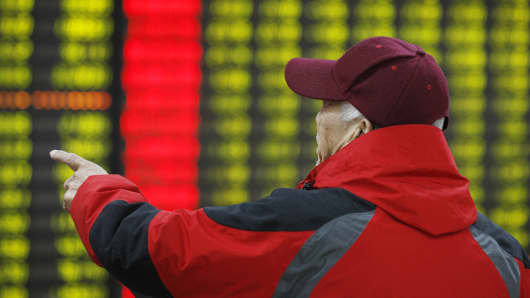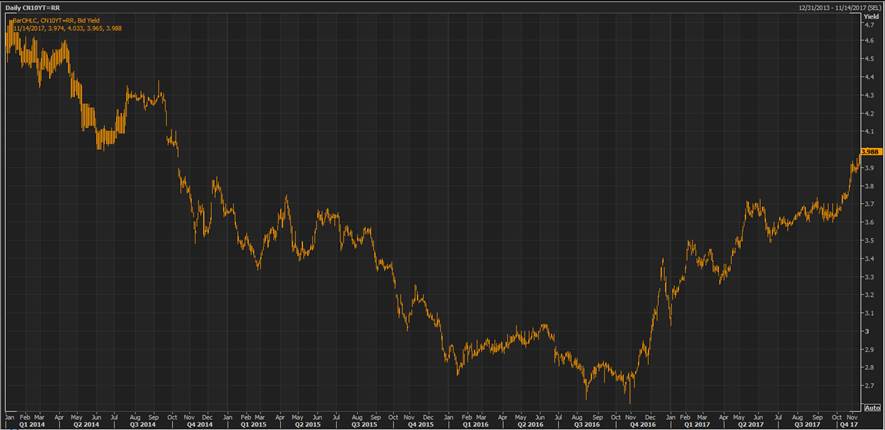China's climbing bond yields raise new concerns for markets

- China's 10-year sovereign bond yield topped 4 percent Tuesday Beijing time for the first time since October 2014.
- Analysts attributed the rise to expectations of tighter monetary policy in China as Beijing makes reforming the debt-dependent economy a priority.
- Benjamin Mandel, a global strategist at J.P. Morgan Asset Management in New York, says a persistent rise in the yield could reverse the bullish global market sentiment.
Add Chinese bond yields to the list of indicators investors need to keep an eye on.
In the summer of 2015 and the beginning of 2016 — the worst start to a year for U.S. stocks — investors were glued to the daily fix of the Chinese yuan against the U.S. dollar. The markets' worry was weakness in the yuan meant growth in the world's second largest economy was decelerating too quickly, out of Beijing's control.
Now some analysts are watching the rise in China's 10-year sovereign bond yield as an indication that growth may slow and spill over to global markets.
The yield topped 4 percent Tuesday Beijing time for the first time since October 2014. Overnight, the yield traded just shy of the three-year high of 4.033 percent.
Of two potential consequences for global markets, "the more worrisome potential outcome would be, the tightening of financial conditions in China would act as a financial market catalyst for a reversal in sentiment," said Benjamin Mandel, a global strategist at J.P. Morgan Asset Management in New York.
Markets would "act independent of what's happening in China's economy," he said.
Chinese 10-year government bond yield (2014 -2017)

The other worry is that China's economy actually does slow more than expected. This week's reports on retail sales and industrial production both disappointed economists.
China's economic growth remains robust at more than 6.5 percent, but 2016 marked its slowest in 26 years. Beijing is in the middle of a years-long process of shifting its economy from dependence on manufacturing to one focused on being driven by consumption. But the country has been reluctant to curb its dependence on borrowing to fuel growth.
The International Monetary Fund pointed out in its Global Financial Stability Report in October that Chinese banking sector assets are now 310 percent of GDP, up from 240 percent at the end of 2012 and nearly three times the emerging market average.
"Authorities face a delicate balance between tightening financial sector policies and slowing economic growth," the IMF said in the report.
Chinese President Xi Jinping said in a lengthy, high-profile speech last month at the 19th National Communist Party Congress that the country will focus on reforms and higher-quality growth.
"A big part of this reform process entails curbing credit growth through a variety of tools, one of which is rates, to help mitigate the risks of a hard landing scenario in the years to come. We see a tightening of monetary policy as a precondition for rebalancing, which could be expected at the cost of further slowing growth," Jose Wynne, portfolio manager on the Man GLG Emerging Markets Debt Team, said in an email to CNBC. As a result, he said the yuan could weaken or China's demand for commodities may slow down.
"We may see moments in 2018 where understandable market anxiety around growth decelerations may take over the market narrative, particularly in EM," Wynne said.
Government bond yields in other countries are also rising. Investors surveyed by Bank of America Merrill Lynch earlier this month cited a bond market crash as one of their top worries. Yields rise when prices fall.
Mandel also attributed part of the latest rise in Chinese yields to some investors being caught temporarily on the wrong side of the trade. Those investors had bought Chinese bonds in anticipation that economic growth would slow, but financial conditions would loosen.
Since authorities have emphasized deleveraging, markets now expect tighter monetary policy, sending yields higher and forcing some investors to unwind their market positions, Mandel said. He expects the Chinese government bond yield will rise beyond 4 percent in the long term.
However, Mandel, Wynne and most other market analysts expect China's economic growth will remain steady, and that policymakers will implement any reform gradually.
Morgan Stanley analysts also published a report Monday explaining "why we are still bullish on China."
"We are more confident that China will be able to achieve a near-stabilization of its debt to GDP by [the second half of 2019] and will attain high-income status by 2025, two years earlier than we initially expected," the report said.
No comments:
Post a Comment
Comments always welcome!